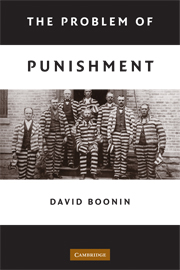Preface
Published online by Cambridge University Press: 05 June 2012
Summary
Most of my beliefs about relatively uncontroversial moral matters are relatively uncontroversial. We should generally be nice to each other, keep our promises, tell the truth, refrain from committing theft, arson, murder, and so on. Most people believe these things, and I do, too. Some of my beliefs about moral matters, of course, are more controversial. But these tend to be beliefs about matters that are themselves more controversial, things like abortion, animal rights, cloning, and so forth. If there were an uncontroversial position on these issues, chances are good that that position would be mine as well.
As far as I can tell, in fact, there is just one conspicuous exception to this general pattern. Most people believe that if it is just and reasonable for the state to prohibit a given form of behavior, then it is morally permissible for the state to punish those who persist in engaging in it. I don't believe this. I don't believe that it is morally permissible for the state to punish people for breaking the law. And I don't believe this because belief in the moral permissibility of legal punishment strikes me as inconsistent with many other things that I do believe.
I've felt this way about punishment for quite some time, and this fact has always struck me as puzzling.
Information
- Type
- Chapter
- Information
- The Problem of Punishment , pp. ix - xPublisher: Cambridge University PressPrint publication year: 2008
